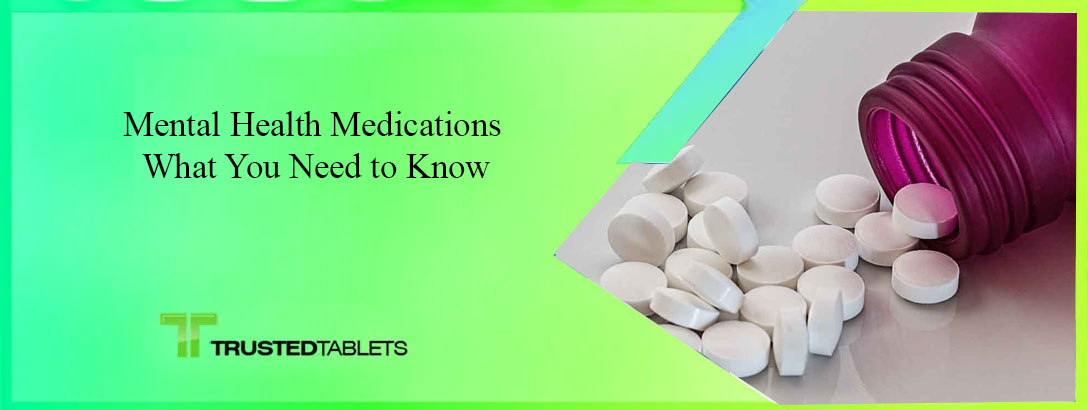Mental health conditions like depression, anxiety, bipolar disorder, and schizophrenia affect millions worldwide. While therapy is crucial, psychiatric medications often play a vital role in managing symptoms and improving quality of life. Understanding these medications—how they work, their types, benefits, risks, and the importance of professional guidance—is essential for anyone navigating mental health treatment.
Why Are Mental Health Medications Important?
For many, medications provide the necessary chemical balance in the brain to alleviate debilitating symptoms that therapy alone might not fully address. They can help individuals regain stability, function better daily, and engage more effectively in other treatments like psychotherapy.
Common Types of Psychiatric Medications & Their Uses:
- Antidepressants:
- Purpose: Treat major depressive disorder, anxiety disorders (like GAD, panic disorder), OCD, PTSD, and sometimes chronic pain.
- Types: SSRIs (e.g., fluoxetine/Prozac, sertraline/Zoloft – most common first-line), SNRIs (e.g., venlafaxine/Effexor, duloxetine/Cymbalta), TCAs (older, used less due to side effects), MAOIs (rarely used, strict dietary restrictions).
- How They Work: Primarily increase levels of neurotransmitters like serotonin and/or norepinephrine in the brain, which regulate mood.
- Anti-Anxiety Medications (Anxiolytics):
- Purpose: Manage acute anxiety, panic attacks, and severe agitation.
- Types: Benzodiazepines (e.g., alprazolam/Xanax, diazepam/Valium – short-term use only due to dependence risk), Buspirone (longer-term option with lower dependency risk), certain antidepressants (SSRIs/SNRIs are often first-line for long-term anxiety).
- Mood Stabilizers:
- Purpose: Treat bipolar disorder (manic, hypomanic, and depressive episodes) and sometimes treatment-resistant depression or borderline personality disorder.
- Types: Lithium (most established), anticonvulsants (e.g., valproate/Divalproex, lamotrigine/Lamictal, carbamazepine/Tegretol).
- Antipsychotics (Neuroleptics):
- Purpose: Treat psychotic disorders (schizophrenia, schizoaffective disorder), mania, severe depression (as add-on), and sometimes severe anxiety or agitation.
- Types: First-generation (typical – e.g., haloperidol/Haldol, chlorpromazine) and Second-generation (atypical – e.g., risperidone/Risperdal, olanzapine/Zyprexa, quetiapine/Seroquel – generally fewer movement side effects). Atypicals are more commonly prescribed today.
- Stimulants & Non-Stimulants:
- Purpose: Primarily treat ADHD (Attention Deficit Hyperactivity Disorder).
- Types: Stimulants (e.g., methylphenidate/Ritalin, amphetamine/Adderall – effective but potential for abuse), Non-stimulants (e.g., atomoxetine/Strattera, guanfacine/Intuniv – used when stimulants aren’t suitable).
How Do These Medications Work?
Most mental health meds target specific neurotransmitter systems in the brain:
- Serotonin: Regulates mood, sleep, appetite (targeted by SSRIs, SNRIs, some atypical antipsychotics).
- Norepinephrine: Influences alertness, energy, focus (targeted by SNRIs, TCAs, some stimulants).
- Dopamine: Involved in reward, motivation, movement (targeted by antipsychotics, stimulants).
- GABA: The main inhibitory neurotransmitter; calming effect (enhanced by benzodiazepines, some mood stabilizers/anticonvulsants).
The Crucial Role of Professional Diagnosis & Prescription
- Never Self-Medicate: Symptoms of different disorders overlap significantly. Only a qualified psychiatrist or physician can accurately diagnose your condition and determine if medication is appropriate and which type is best.
- Personalized Treatment: What works for one person may not work for another. Finding the right medication and dosage often involves trial and adjustment under medical supervision.
- Monitoring & Management: Regular check-ins with your prescriber are essential to monitor effectiveness, manage side effects, adjust dosages, and ensure safety.
Understanding Potential Side Effects:
Like all medications, psychiatric drugs can have side effects. Common ones include:
- Nausea, dizziness, headache
- Drowsiness or insomnia
- Weight changes, sexual dysfunction
- Dry mouth, blurred vision
- (Specifics vary greatly by drug class and individual)
Most side effects are manageable or diminish over time. Always report any concerning or persistent side effects to your doctor immediately. Never stop taking medication abruptly without consulting your provider, as this can cause withdrawal symptoms or a relapse.
Debunking Myths vs. Facts:
- Myth: “Medications just numb your feelings.” Fact: Properly prescribed medications aim to restore emotional balance, not eliminate all feeling. They should help you feel more like yourself, not disconnected.
- Myth: “Once you start, you’re on them forever.” Fact: Duration varies. Some people take meds long-term for maintenance, others may only need them for shorter periods during acute episodes or while learning coping skills in therapy.
- Myth: “They’re addictive/craving-inducing.” Fact: Most psychiatric medications (like SSRIs, mood stabilizers, atypical antipsychotics) are not considered addictive in the way substances like opioids or alcohol are. However, some (benzodiazepines, stimulants) require careful prescribing and monitoring due to potential for physical dependence if misused or stopped suddenly.
Conclusion: Empowerment Through Knowledge
Mental health medications are powerful tools that, when used correctly under professional guidance, can be life-changing. They are most effective when combined with therapy, lifestyle changes (exercise, sleep, nutrition), and social support. If you’re struggling, know that seeking help is a sign of strength. Talk openly with your healthcare provider about your concerns, symptoms, and goals to find the best path forward for your mental well-being.


